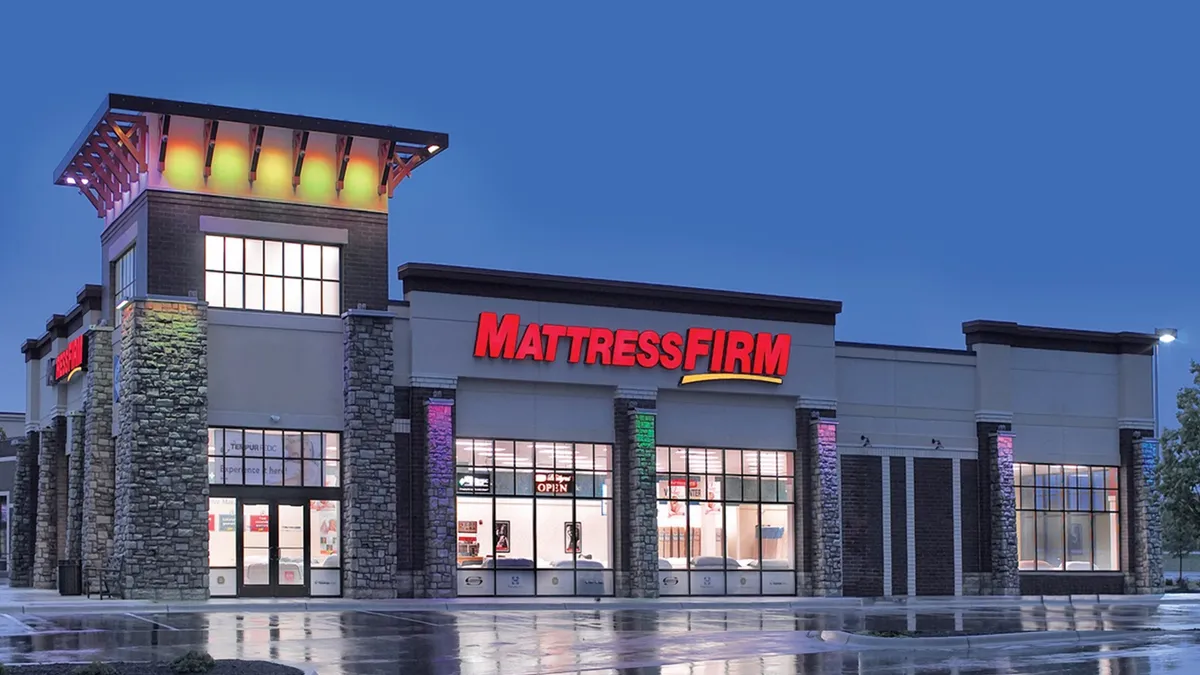Dive Brief:
- Tempur Sealy and Mattress Firm Group are seeking an injunction in federal court for the Southern District of Texas to stop Federal Trade Commission administrative proceedings that seek to block the mattress maker’s acquisition of retailer Mattress Firm.
- The mattress manufacturer’s complaint, filed Friday, asks a judge to rule that a federal court, not an FTC administrative proceeding, is the proper venue to decide the case.
- Also Friday, Tempur Sealy said it has secured a new $1.6 billion term loan. The company plans to use the proceeds from the recent loan along with other debt proceeds and cash to fund the acquisition of Mattress Firm.
Dive Insight:
Tempur Sealy’s decision to sue the FTC over the agency’s challenge to its acquisition of Mattress Firm is the latest turn in a case that began last summer, when the mattress maker announced it had reached a $4 billion deal to acquire Mattress Firm.
The FTC’s federal court case against Tempur Sealy is scheduled to begin on Nov. 12 with an evidentiary hearing before Judge Charles Eskridge in Houston that’s expected to last two weeks, according to court docket information. At the heart of the matter is Tempur Sealy’s claim that a federal court — not an agency administrative hearing — is the proper venue to resolve the FTC’s claims regarding the acquisition.
In challenging the deal, the FTC said in a July statement if the move goes through that Tempur Sealy would “have the ability and incentive to suppress competition and raise prices for mattresses for millions of consumers once it acquires Mattress Firm.” The combined company would have “enormous power and multiple parts of the mattress supply chain.”
As part of its engagement with the FTC, Tempur Sealy said in September that it had reached an agreement to sell 73 Mattress Firm locations, it’s 103 location Sleep Outfitters subsidiary and seven distribution centers to rival retailer Mattress Warehouse. The rival retailer is much smaller, with about 300 locations. If this deal goes through, Tempur Sealy would operate over 2,800 retail stores worldwide, with Mattress Firm generating half of its North American sales.
In its court filing, Tempur Sealy notes that the FTC’s administrative proceeding starts before an FTC administrative law judge “and ends with the same five Commissioners who voted to challenge Plaintiff’s merger in the first place.” With that structure in place, “unsurprisingly, the FTC almost always wins,” the company said in its 20 page lawsuit, which also noted that the agency has won every administrative proceeding they’ve brought before themselves for the last 25 years.
“The bedding industry is highly competitive, including thousands of brick-and-mortar storefronts and a vast online marketplace,” Tempur Sealy CEO Scott Thompson said in a statement. “The combination of Tempur Sealy and Mattress Firm will deliver incremental benefits to consumers and opportunities for employees, from enhanced product innovation to an improved customer buying experience and strengthening the entire financial position for the company.” For the quarter ended July 29, Mattress Firm reported revenue of $982 million, which was nearly flat year over year. Mattress Warehouse is privately held.
Tempur Sealy’s brand portfolio includes Tempur-Pedic, Sealy and Stearns & Foster. The company also has non-branded value-focused private label and OEM products. The company sells products through third-party retailers, e-commerce and a global footprint of over 750 company-owned stores. Mattress Firm has a physical store footprint of over 2,300 locations.
















